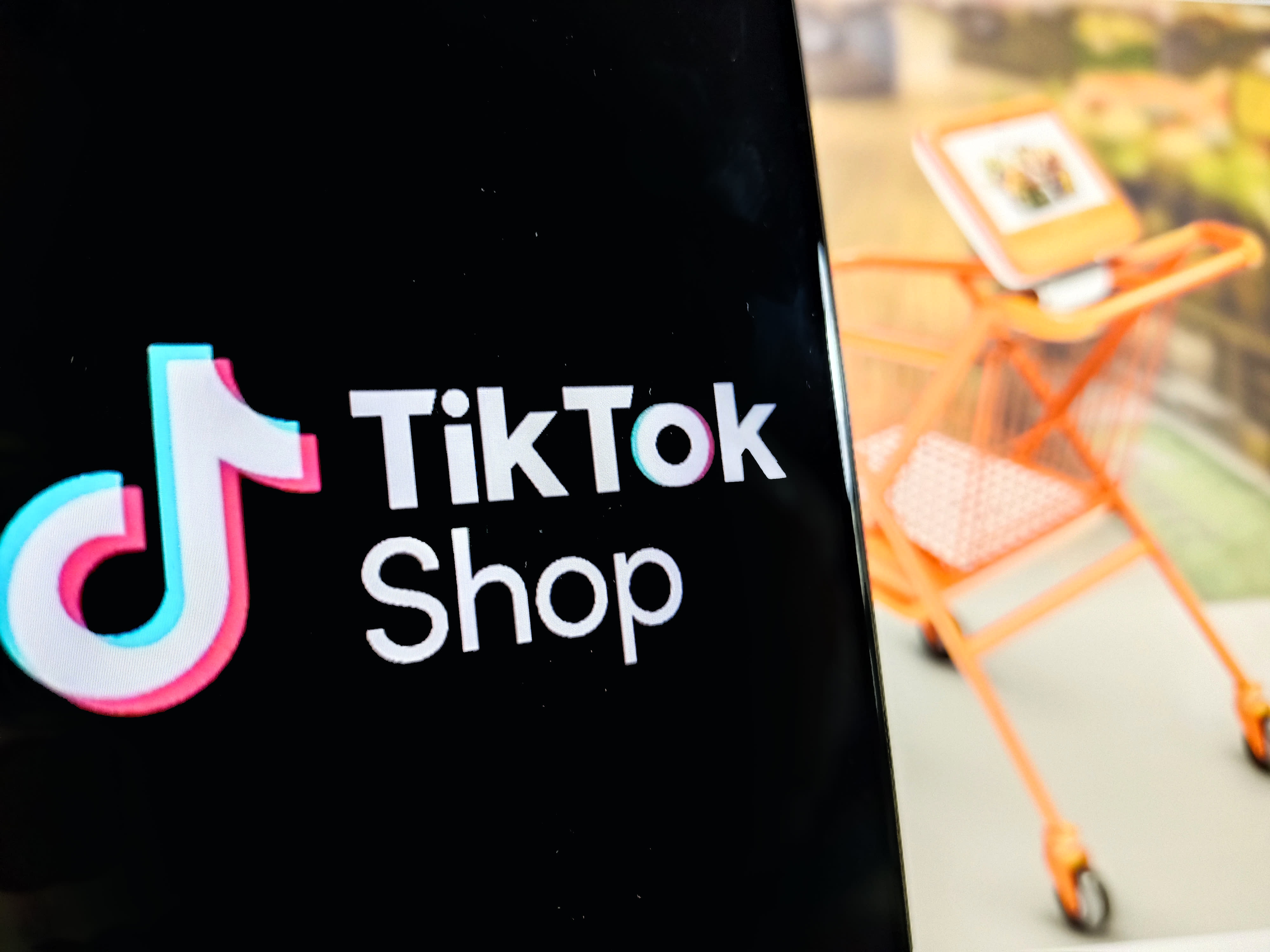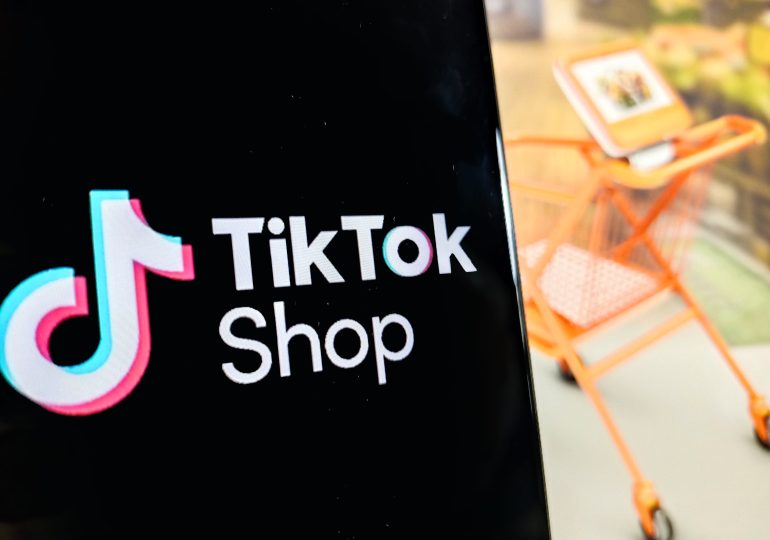
TikTok has officially launched its e-commerce service TikTok Shop in the US.
Costfoto | Nurphoto | Getty Images
Consumers are increasingly turning to social media for their shopping this holiday season, and TikTok’s latest venture into e-commerce has emerged at the forefront. For some, it means weighing the convenience of mobile shopping and often low prices against ethical questions.
The platform introduced TikTok Shop in the U.S. in September as an in-app shopping experience, capitalizing on the #TikTokMadeMeBuyIt trend. The shop gives opportunities to both content creators who could sell their own products and avid TikTok users who could buy directly on the app, following in the footsteps of other social media apps such as Instagram.
Though TikTok Shop previously faced backlash and was forced to shut down in Indonesia, consumers are increasingly trending toward buying off social media.
A recent Shopify-Gallup survey says nearly half of respondents ages 18 to 29 said they plan on buying some holiday gifts on social media apps. And according to an ICSC report, 86% of Gen Z shoppers — which it defines as ages 16 to 26 — say social media influences their shopping habits.
One TikTok Shop enthusiast is 29-year-old Chuck Vaughn, who called the TikTok Shop phenomenon “a gold rush.”
“There’s some crazy coupons on there combined with sale prices, and then you end up getting things 50% off or 60% off,” the Tennessee resident told CNBC. “There’s no good reason to not be using it as far as I can tell.”
Though some argue that using the platform strips shoppers of their privacy, Vaughn said it’s clear that consumers today are already giving up data in most of their apps. Instead, he’s leaned into the trend, with his most recent purchase being Pokemon cards. Whereas the market price for cards would normally be around $70, Vaughn said, he bought his on TikTok Shop for just $33 with free shipping — and they arrived in under a week.
Vaughn said he plans on doing at least some of his holiday shopping on the app and is recommending his friends and family use TikTok Shop as well.
Social media and commerce
With in-app purchases, the ability to buy quickly is even more prevalent. It’s a trend that was especially bolstered by the earlier days of the pandemic, when people were largely staying home either due to mandates or worries about catching Covid. According to the U.S. Department of Commerce, Americans spent $791.7 billion on e-commerce during 2020.
According to TikTok, the Shop platform has more than 200,000 sellers, and the #TikTokMadeMeBuyIt hashtag has more than 77 billion views as of this month. For this holiday season, TikTok said, the Shop feature will include multiple promotions, coupons and deals on trending products.
Though in-person commerce has made a comeback post-pandemic, according to Gartner digital commerce analyst Ant Duffin, consumers’ propensity to buy online has undoubtedly surged in the past few years.
The social media commerce landscape has constructed a particularly interesting ecosystem made up of brands, creators, technology and consumers, each playing a role in bolstering the e-commerce space, Duffin told CNBC.
“What you’re now starting to see is TikTok bucking the trend where they’re providing a complete social commerce ecosystem of tactics, from paid advertising to short-form video through to immersive shops and being able to transact all within the app,” Duffin said.
This new realm could be a “fresh battleground” for small and medium-sized businesses, according to Duffin. Especially over the holiday season, smaller businesses can raise awareness and build their brands successfully on the social media app and fill in the gaps for brands looking to capitalize on new market opportunities.
However, Duffin said he does not believe TikTok Shop will be able to rival the likes of Amazon or have an impact beyond a stocking stuffer purchase just yet.
Questioning the ethics
But not everyone is a fan of being able to scroll and purchase simultaneously.
Grace Romine, a sophomore at Indiana University, said she first found the Shop feature to be annoying, especially with the increased advertisements. She also said she found it was drowning out some of the creative content produced by creators on the app.
Romine said she doesn’t agree with some of the ethics of the products being sold on the app, especially with lower prices prompting broader conversations about where those products are coming from.
“TikTok Shop does offer the opportunity for small businesses to succeed, and small businesses really need e-commerce platforms,” she said. “But a lot of the products I’ve seen that thousands of people are promoting are not small businesses.”
“They are, you know, the $4 purse,” she said, “and if they’re selling it for $4, what are the ethics behind that? Is it sustainably made? What kind of labor was used to make this product?”
Romine said the combination of fast fashion and overconsumption work together to sour her taste for the Shop feature, even as she sees classmates walking around campus in sweatshirts she’s seen ads for on the app. She’s also eager to see how the app adapts to its “first Christmas” in the holiday market.
For Fordham University senior and history major Ana Kevorkian, the ads have become increasingly tempting even though she’s “principally opposed” to buying anything on TikTok Shop. She said she’s specifically had her eye on a leather purse being sold for $3, but she’s still questioning the ethics behind it.
“I try to be intentional about my shopping, and I think TikTok Shop is the exact opposite of intentional shopping,” Kevorkian said, adding that it encourages people to overspend and overconsume.
“It takes 10 seconds to go onto [web browser] Safari and buy something, and that’s not a huge inconvenience,” she said. “If we need to shop so much that that is too much, then there is something wrong with the culture.”
Still, every time that leather purse pops up on her For You Page, Kevorkian said she hesitates. Since she’s never bought anything on the app, she has an automatic 70% discount for her first purchase.
Correction: This story has been updated to reflect that the recent Shopify-Gallup survey says nearly half of respondents ages 18 to 29 said they plan on buying some holiday gifts on social media apps, and that the ICSC report defines Gen Z shoppers as ages 16 to 26. A previous version mischaracterized the age groups represented in those surveys.









